He was out there, back and forth. He started off with just a canoe, but the next thing you know, there’s a pack of people helping out.
Dog training, skydiving, and Persian rugs: a seemingly disparate trio which all inform the life of Houston’s own Hamid Parvizian. In speaking with the man, I get the impression that he’s been something of a well-known neighborhood fixture, at the least for his emphatic work in the realm of dog obedience training at any one of his Sit Means Sit locations. However, as I would come to learn, he didn’t originally start out invested in working with dogs, though he has experienced marked success and great personal satisfaction in this field. Nor, for that matter, was he a trained member of a volunteer rescue team.
It all actually began on Facebook at the brink of Hurricane Harvey, the catastrophic tropical storm which ravaged southeast Texas with flooding. Hamid’s friend Shirin Etemadi remembers the day: “Originally, I got involved because I had no flooding issues in my house. I was sitting there thinking, there’s no way I can continue just watching the news and not doing anything. On social media, a girlfriend of mine had posted that she was looking for people for boat rescue and truck rescue. I was sitting at home, I didn’t have work for a week, and I realized that I had to do something—people were in imminent danger.”
Shirin wasn’t the only one feeling this way. Hamid Parvizian was hunkering down and preparing to weather the storm with his dogs at home, but he also happened onto Facebook, trying to figure out the state of affairs. A snowballing series of decisions later and he was out the door, driving off in his jeep to help evacuate those in need, heading a homegrown rescue initiative that would evolve and accumulate other individuals as time went on.
If Hamid was the man on the scene, Shirin was behind it the whole time. Although she was established at home with her six-month-old child, she was able to contribute to the efforts as an impromptu dispatcher, committing her time over the next few days as a kind of Oracle to Hamid’s Batman. In the wake of the emergency, Houstonian developers PhaseFour quickly created a website, HoustonHarveyRescue.com. “This became a live platform where people could go and let rescuers know that they needed help, or if family members needed help,” Shirin describes. “You could input details, like: who needed rescue, if there were any elderly people there, any pets, etc. Then, a pin would be dropped on the map.”
Shirin had technology, insight, organizational skills, and time on her hands. “It was easier for me to be the middleman. I could confirm what people were wearing for the rescuers, tell them where to wait, and even call their contacts to let them know that they were being rescued. Then, I could mark them as safe on the website.” By taking on these responsibilities and navigating rescuers to the evacuees on the map, she was able to fully support these teams, and ensure that their attention was most efficiently applied.
As for Hamid, he remains upbeat and encouraged despite the strange and unexpected horrors he surmounted during Hurricane Harvey, or the recent loss of his father. A thrill-seeking family man, aspects of this adventure seem momentously aligned with his passions and beliefs. Or, as Shirin describes him, “Big big heart, adrenaline junky, just a good guy all-around…For him, I feel like it was a very gratifying thing. It fed his soul.”
Hamid graciously offered to speak with The Iranian, and the incredible story he shared is that of a man who heeds the call for help with every available resource, and inspiring those around him to do the same.
The Iranian: How are you doing? And once again, my condolences for the recent loss of your father.
Hamid Parvizian: Thank you so much. My father was diagnosed with glioblastomas on June 7th, a really aggressive brain cancer. We weren’t sure he’d make it through surgery, and he did. You can’t always focus on all the bad, though; really, at the end of the day, nothing you’re going to do will change it. So at least God blessed us with time, to give us closure. We got to enjoy every day spent with him, and each of those days was a gift from God. My dad was suffering, and he’s not suffering anymore. Seeing the way that he was, as much as I miss him, at least in some way, he’s at peace.
It’s been hard but, at the same time, I knew how much pain he was in, in the end. So we just feel blessed by the time we had with him.
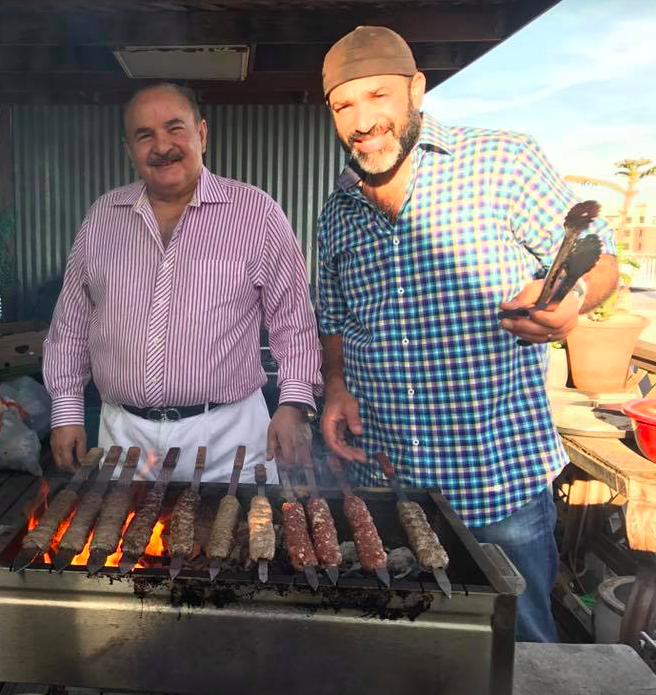
The Iranian: Being notified about a person’s terminal state can be both a blessing a curse. The fact that this happened not tremendously long before the hurricane hit—this has been quite a year for you.
Hamid Parvizian: It’s been an adventure for three months, let me tell you. It’s felt like a year.
The Iranian: So, Sit Means Sit is in Houston? Are there various other locations in Texas?
Hamid Parvizian: Sit Means Sit is a franchise, there’s 124 locations around the nation. I own three franchises in the area: two in Katy, one in The Woodlands, and also one in Dallas, although we all operate as one.
The Iranian: Where were you born, and where does your family come from?
Hamid Parvizian: My family is originally from Iran. My mother is from Tehran, and my dad’s actually from a little city outside of Tehran called Karaj, where he grew up. They moved to the US back in the late 60s.
The Iranian: So you were born here in this country?
Hamid Parvizian: I was born in DC.
The Iranian: How did you get over to Texas?
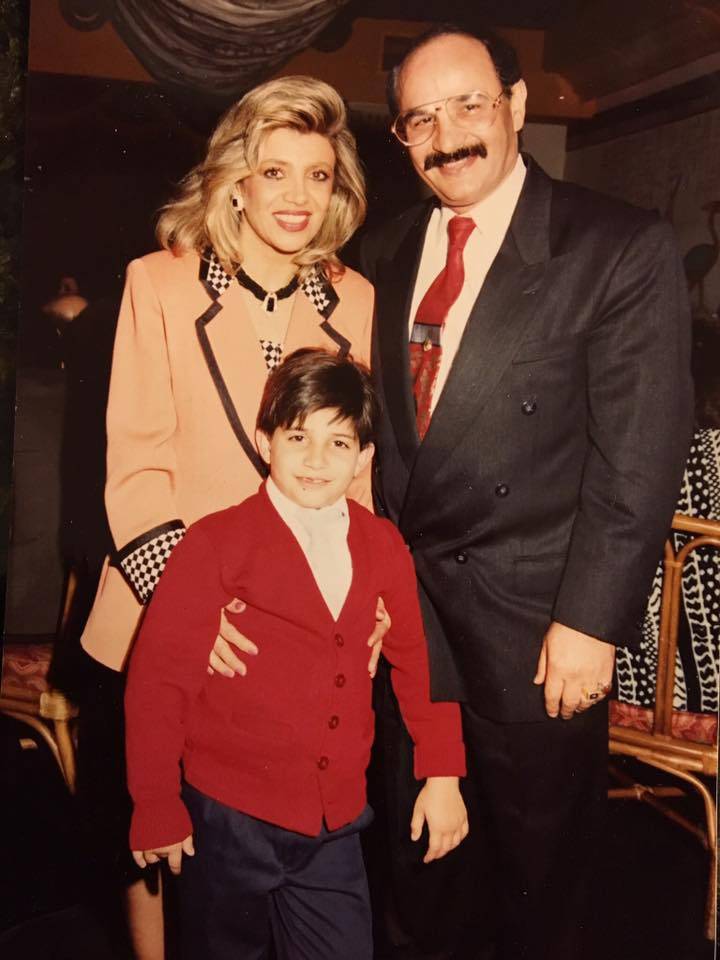
Hamid Parvizian: We moved in here in 1969. Two years after I was born, my father was running a Persian rug store. One of my dad’s clients told my dad “Hey, Houston’s a great market to be in.” My dad took the word of his friend, packed up blindly, and moved the whole family to Houston. This was in 1979.
The Iranian: So, boom, you’re in Houston selling rugs right after the Iranian Revolution.
Hamid Parvizian: There’s a bit more to it; my dad was actually shot. He was driving a taxicab, waiting tables, putting himself through school. My sister was born in 1970, and this happened like 2 or 3 days after she was born, so my mom was still in the hospital.
He was driving a cab, when some people pulled a gun and tried to steal the like $25.00 that he had, but he refused to give it up, as that’s all he had for the family. He wrestled the gun away from one, but another guy got the gun and shot him four times. He had bullet fragments in his face and shoulder from that. So he was in the hospital at about the same time my mom was there with my sister.
After this happened he kept working, graduated, put himself through GW [George Washington University School of Medicine], got his medical engineering masters, then opened an Oriental rug store here with his brother.
The Iranian: So he opened the store in DC, then moved on over to Houston. So you’re pretty rooted in Texas.
Hamid Parvizian: I treat Texas as if I was born here.
The Iranian: So what has been your experience growing up as an Iranian-American in Texas?
Hamid Parvizian: We actually have a really large Iranian community here in Houston. I even recently found out that one of my friends in school was in one of the first Persian families to move into the neighborhood. But Houston has a very large Persian population. Houston, New York, DC, and LA all have big Iranian populations.
The Iranian: Atlanta too, I feel, is emerging as another.
Hamid Parvizian: Iranians took over LA and NY—they found the two greatest places to be! [laughs] Others found DC, Atlanta, they migrated to some really nice places. Persians assimilate very well, especially in the technology corridor and such; they are a people who have adapted.
The Iranian: I think that’s been a detail in most of the stories like these that I’ve followed.
So, where do we connect Persian rugs and caring for dogs and teaching obedience?
Hamid Parvizian: [laughs] You could ask my dad the exact same thing, he didn’t get it for the longest time!
I’ve always had a love for dogs, I’d actually go to friend’s homes and spend more time playing with their dogs than them! As for my father, it’s not that he was against them, but it’s like, when your life is Persian carpets and you grew up in Iran, dogs are not the greatest friend to either one of those concepts. [laughs]
I didn’t get my first dog until I went away for college. Dogs just had a different way of being. I loved everything about them, always loved being around animals in general. Years went by and I loved training my dogs, but everywhere I went, my friends would say “Hey, you really should get into something in the dog world.” I’d say sure, I enjoy them, but I have to make a living as well. So for years I was doing other things, but if I’d go to New Orleans on vacation with friends, my dogs would always be there.
I got divorced in 2009. It was kind of a semi-arranged marriage I probably shouldn’t have gotten into, but I loved my dad. I didn’t want to get married, but I knew he wouldn’t get off my back [if I didn’t]. I kind of approached it like a business venture in a way. That was a bad point of view.
So when I got divorced, I kinda started from ground zero again. It was a big ordeal, because even though it was the best thing that happened to me, it was also one of the hardest. One thing I fought for was my dogs. Right before we got divorced, I inquired about learning dog training, because I had done work with so many trainers before, and was so fascinated by what they accomplished with Sit Means Sit. So I thought, if I ever got into dog training, it would only be with that company.
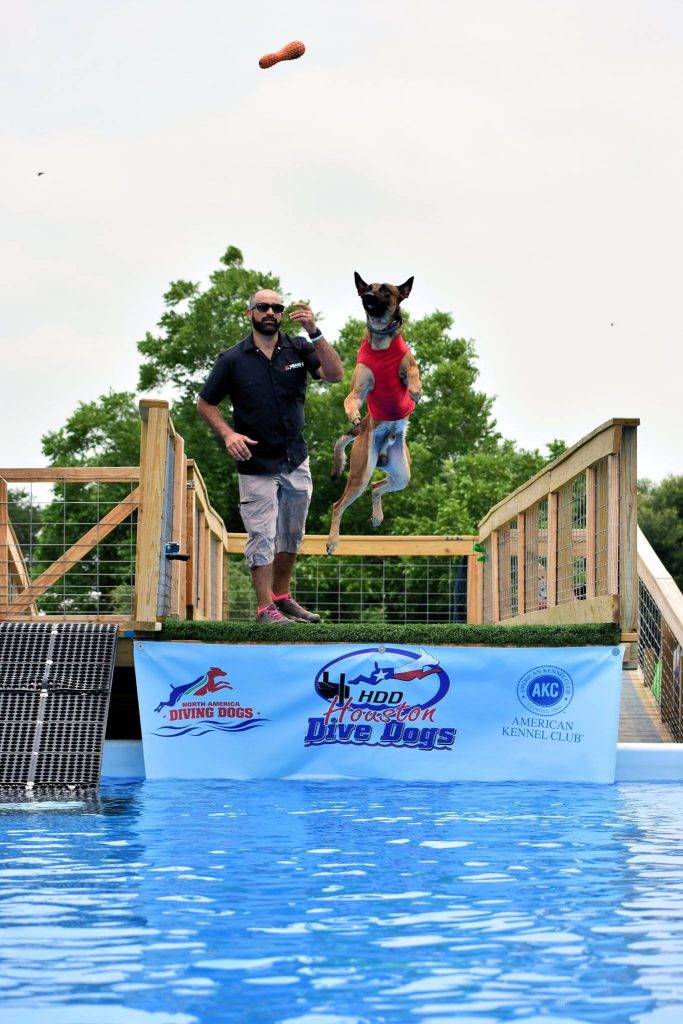
But when we got divorced, the Houston market was taken. Still, I figured that now’s the time [to pursue this]. I thought, let me spend the time to train some dogs, maybe open a dog hotel, since what I was doing professionally at the time did not make me happy. I decided to follow my passion and trust my friends’ suggestions. I ended up making a call two years later and the Houston market was for sale. I jumped on it in a heartbeat.
I bought the franchise, started training, and it’s almost eight years later now and I till haven’t gotten that dog hotel opened up! Four locations, tons of staff; we’re the number two Sit Means Sit location among the 124 total. We’re right behind number one by a nose, from what I found out.
I do a lot with the dog world. I’m on the board of directors with a therapy dog organization called The Go Team. We do a lot of therapy dog work all around the nation. I’ve always enjoyed being at these therapy dog events, because I love seeing my dogs making people happy, but until my father got ill, I never realized how much these therapy dogs helped all these other people training them. All my dogs and clients in training, they were my therapy to help keep my mind off of my father’s situation. That’s the thing that helped me keep moving, because I couldn’t just lay back on the sofa; these dogs needed me. They were there when I needed the emotional support. So it really did change my life.
About two and a half years ago, my father really came around due to hearing about my results, hearing about how we were doing bite prevention—I do seminars for the postal service, for ticks, for schools, I do seminars here and there around the nation—he started hearing my name more and more. It wasn’t just that his son was a dog trainer, but there was actually skill, talent, and lives that were being changed. He became one of my biggest advocates. For me, it was one of the best feelings because it was hard-earned—he was a disgruntled Persian father, because I was neither a doctor, nor an attorney, nor followed his passion in the rug business—instead I opened a dog training company.
After that, he was always talking about closing his rug store and partnering up with me in the dog business. I was like “I love this job too much for you to get involved!” [laughs]
I deal with dogs of every temperament and breed. People get rewarded a lot of different ways. I mean, I could love the rug business, but I’m also an adrenaline junky. I move a lot. I’m an active skydiver. I’ve been skydiving for six years now, with right over 500 jumps. I snowboard, I do triathlons for autism. I do a lot of charity work for autism and raise awareness there. I do wing-walking, which started in Seattle. That’s where you climb on top of a plane and do acrobatics on the wings.
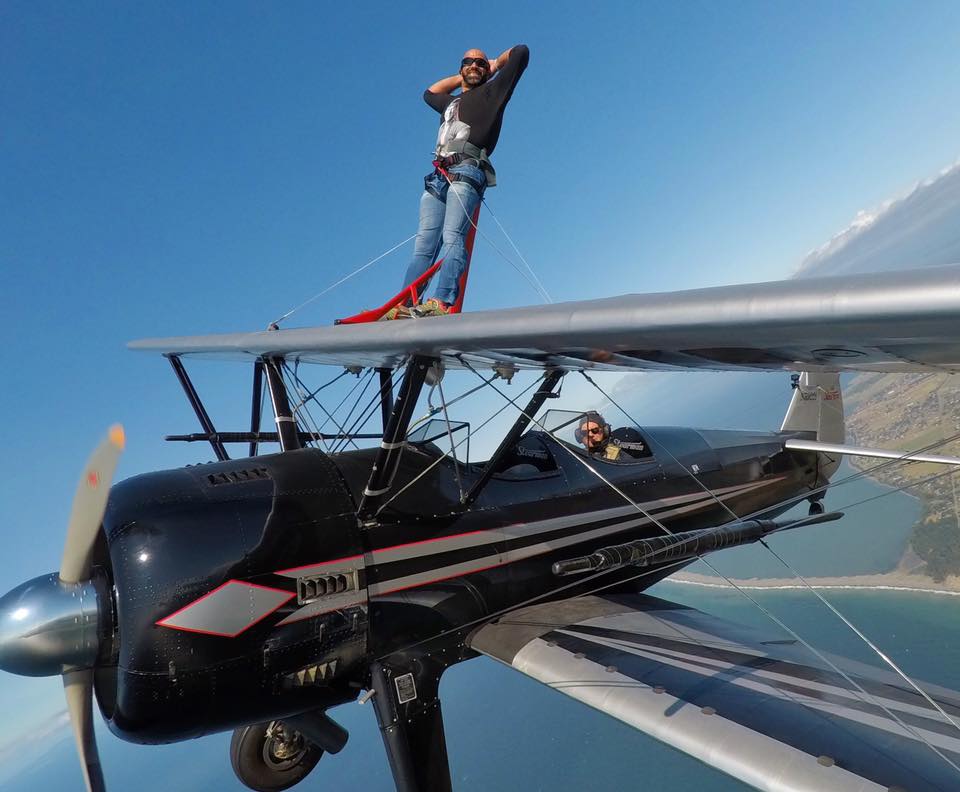
That’s why I couldn’t just stand in a store and sell rugs, I needed something more action-packed. And the dogs give me a lot of that. While financial rewards are good, it’s the reward of seeing the dogs, seeing a change in relationship [with their owners], bettering their lives, that’s my favorite thing.
My favorite cases are some of the hardest cases, because the results are so outstanding, and most rewarding. Like seeing a dog that was originally going to get put down for aggression.
We had a dog training to be a therapy dog, but he was super-reactive, couldn’t be around other dogs. Number one, he’s a pit bull. Now, the dog is a great therapy dog, great with kids, great with people. The owners live a life with that dog that they could never have imagined before. That’s more rewarding than anything else.
The Iranian: Any pit bull that I know who has been raised properly is just a tiny baby. I live in the Bronx, and there’s pit bulls all over the place here. They’ve notoriously gotten a bad rap most of the time I’ve been alive, but that behavior is an utterly false evaluation for many of the pit bulls that I’ve met.
Hamid Parvizian: That’s just it. And what bothers me is that somebody who will sit there and talk bad about a pit bull would never say all Persians are bad, all Mexicans or white people are bad (then again, they might). But it’s all about how people are raised, and pit bull owners need to be ambassadors for the breed.
Earlier, you asked me about what it’s like growing up Persian. One thing my father always taught me, even in his situation, is finding the best side of life. You can always see the bad, that’s easy. But finding the good in any situation is hard. Growing up Persian, I feel like it’s my job to be the ambassador for Persians. People say hey, I never realized you were Persian or Muslim. That’s what I prefer, rather than giving them back the expectation they’ve been fed.
Same thing with Pit bulls. It’s their jobs to make sure that people know that their dog is better than any dog in the world because, unfortunately, they’re under the microscope more than any other dog in the world. So do your job and change that perspective.
The Iranian: Do you get a large percentage of pit bulls at Sit Means Sit?
Hamid Parvizian: We get all kinds, really. I’ve had super-aggressive golden retrievers. You get all shapes, sizes, and breeds.
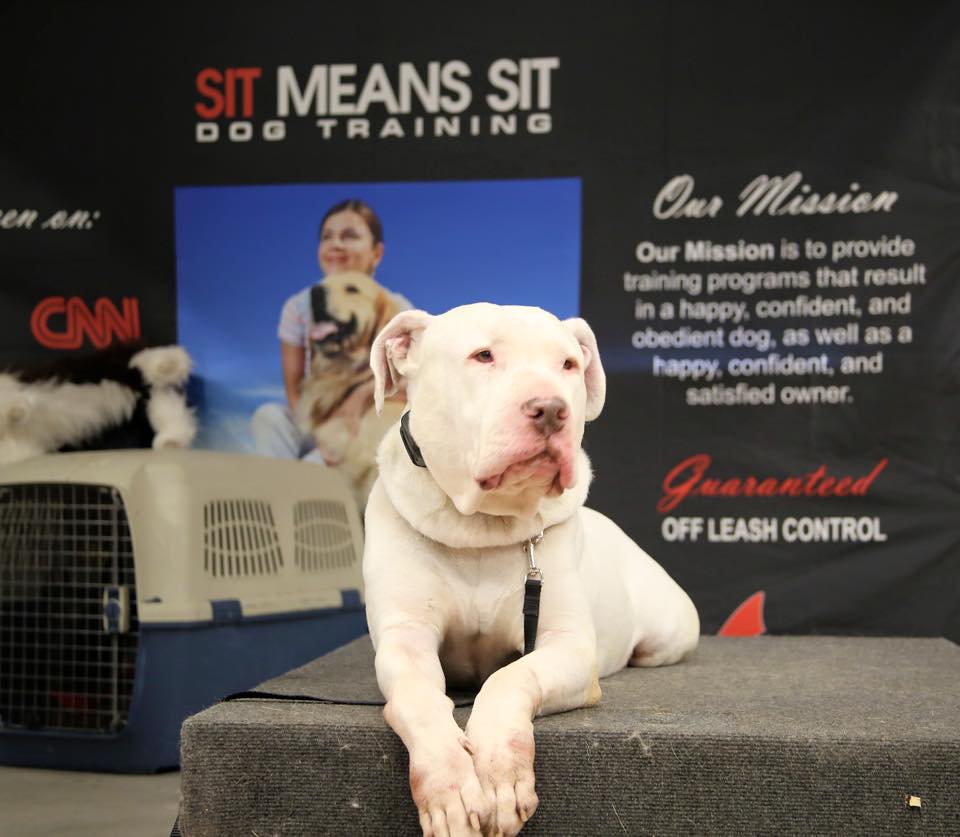
The Iranian: I’ve heard a bit about some of your efforts in Houston. If you could, walk me through the start of that story. What time-line are we talking about? Was the hurricane already on its way? Are you already mobilized, expecting it?
Hamid Parvizian: No, quite the opposite. First, we attended to the dogs we were boarding, making sure all hurricane procedures were in place for their safety. I couldn’t jeopardize the safety of any of my team, either, so the dogs that were able to go back home, went. At the end, we had about four left, so I took them with me back to my house. [I figured,] at least I’d be home, and if we had to mobilize I could take them with me. So I took them all home, and we were just preparing for the storm.
In Houston, we’ve never had what we had this year. We’ve had really bad rains. Sometimes we’ve had to hunker down for about a week. It would got better, and then we were off.
Houses that had never even seen water rise that high were completely flooded, and Houstonians had never seen that amount of rainfall before. I was just trying to make sure my staff and dogs were safe and okay. Luckily for me, my wife was visiting a friend of hers who had just had a baby, so she had my daughter with her in Boston. I knew that they were safe.
The next morning—I think it was Saturday—we were joking around about how we were in Houston and expecting a hurricane but nothing happened. The weather was beautiful…but I was watching the radar. Saturday night it really came down, and I started seeing the news, and all the reports, and the people. Houston wasn’t really prepared for any of that.
A friend of mine had made a post on Facebook, a doctor in Houston, and was asking if anyone had a canoe he could use to help his neighbors. I thought that was a brilliant idea. And so I quickly posted as well, asking if anyone had a boat or a kayak and wanted to help others, but if they can’t? I’m available. I posted in a couple of neighborhood boards, and on my personal Facebook as well.
A lot of it was still connected to my father. He’s always been very philanthropic, always did his best to give when he could, and that [sensibility] combined with my own sense of adventure. I could help people, but I also have an adventure! It was a little bit of both. How often would you be able to boat down Houston, or pilot a dinghy with an engine?
The Iranian: So the Facebook posts got results?
Hamid Parvizian: I immediately started getting all these responses from people who were offering boats and canoes. So we ended up with a lot of people offering, and I also had my jeep. My jeep was able to get through quite a bit of the area. [Altogether,] I knew that I was pretty mobile. And so I basically took a couple of people up on their offers, loaded up two kayaks on the top of my Jeep, and set out. One of my trainers was flooded out of his house, so he was staying with me, helping with the dogs as well. He said, let me join you. So the two of us set out, and we starting on one side of town.
I then reached out to one friend that I knew had a boat. I called him and told him that I really needed the help of that boat for one specific area. He went ahead and loaded up his car and joined me, and all of a sudden that team built up.
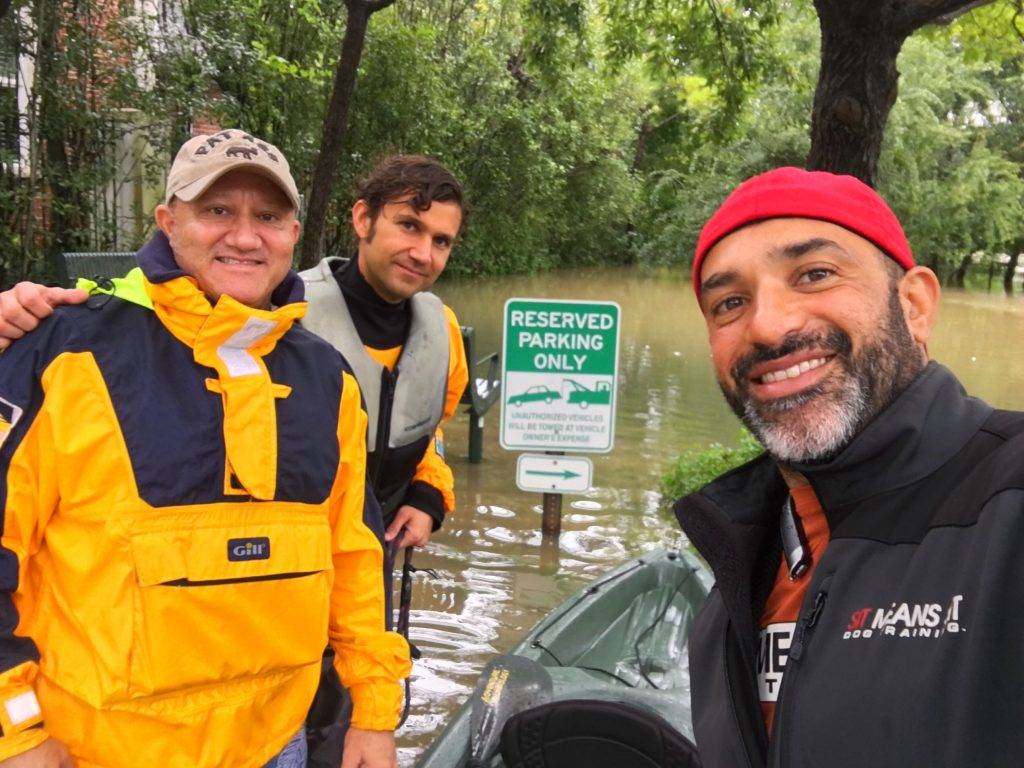
My trainer ended up staying home the next day because the dogs needed walks, so I met up with that friend each day. Soon, my phone started blowing up from all these people that wanted to help. It was great! Every day we had a different group. We had two kayaks, a canoe, and a dinghy with an engine to get through both shallow and deep water, to cut through the currents. In some spots the currents were really bad, and a couple times we got tossed around. But we were getting out there, loading people up, loading up their suitcases, and getting them out of danger.
Another thing that really got this inspiration going [relates to] a dear friend of mine named Rose Hubert. I’ve know her family and I love the parents. She had posted how she hadn’t heard from them, and that they were stuck in the house and wouldn’t leave, and how she was worried and wanted to know if anyone had heard from them. So my first stop when we got on location was them. I knew, at the time, that they had no intention of leaving their house.
I have a battery-powered generator, called an Echo Flow River, that I’ve taken camping before. It can power televisions, small refrigerators, phones, it’s got USB ports, car chargers, and regular outlets. I knew that [this family] didn’t have power, but I took this with me for them, because they could charge it by vehicle, so at least they could have a working cell phone. [Rose] said that they left their phones turned off, and would only turn them on when they needed them, because they wanted to conserve power.
So I took them water and food, and thought I would leave them my generator. With phones, they’d probably get 40 charges out of it before the battery had to be recharged. So I brought it to them, then convinced two of them to leave so that they could showered and changed. Then I actually convinced her father to follow. I said “Look guys it’s really bad out here.” The kayaks were actually floating inside their house—we rode them into their actual house, and the water was knee-deep in there.
I told them, look, I’ll bring you back tonight, at least let’s get you to my sisters house, get you a hot shower and some good food. And then, if you want, I’ll bring you back home. So we loaded them up, I called up their daughter immediately and let them talk, then took them to my sister’s house, which was uptown, and set them up there.
[Afterward,] we ended up going right back out, hitting up a couple neighborhoods and continuing that effort of getting people out of their homes. Most people, once they got out, realized how bad it was and didn’t go back. There was a concern for property, sure, but they understood the danger of going back to where they were.
We went to one house after another, getting dogs, people, whatever we could do.
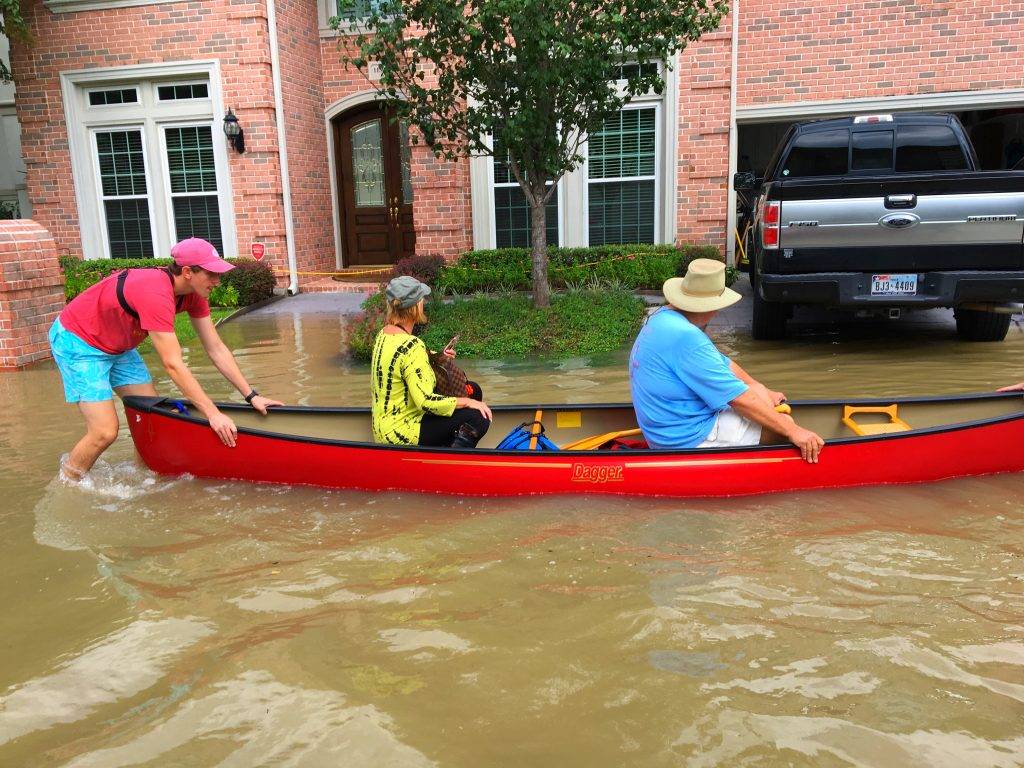
The Iranian: All of this from a Facebook post.
Hamid Parvizian: A lot of this was all happening on Facebook. A friend of mine, Shirin, she even started coordinating people here and there. Soon, she was sending me addresses like, “Hey you’re in this area, can you go here?” So every lead I got I started sending to her. She was coordinating a group of like 15 people, some she never even knew, and it just grew and grew. She knew pretty much where everybody was, so she would send them to the closest areas, and that way we weren’t all showing up at the same houses, or going to homes that were already evacuated.
So she was coordinating me, I just sent all my leads to her, and she was sending me out house to house. I would confirm that I got them out, and she would send us more leads.
The Iranian: She was like an impromptu dispatcher!
Hamid Parvizian: Shirin was awesome! Also: Persian. But she really took the reins and ran with it. She was the perfect dispatcher, and I think we were really effective thanks to her help, because we were able to make the most out of our location and time.
The Iranian: Anything funny that you encountered on this adventure?
Hamid Parvizian: The most humorous was that, a couple of people in the homes that I knew, and a few that I didn’t, were actually Persian. Sometimes, I would [announce myself], and some of them became nervous. But when I started speaking Farsi, they were shocked that it was me. In some other homes I’d arrive at, I’d hear an accent, ask them if they were Persian, and then started speaking Farsi. Then [these strangers] were genuinely shocked that a Persian person was doing this.
What I loved most was that everyone helping out was united. Race, religion, republic/democrat, no questions were asked. Everyone was a team, and everyone did their part. There was a group of people who came that had bought all these socks. [Evacuees] were coming offshore to the safe area, and they were being given clean socks for kids and adults, which they could change into because their socks were wet.
It was an amazing thing to see it come together. You couldn’t not want to get involved.
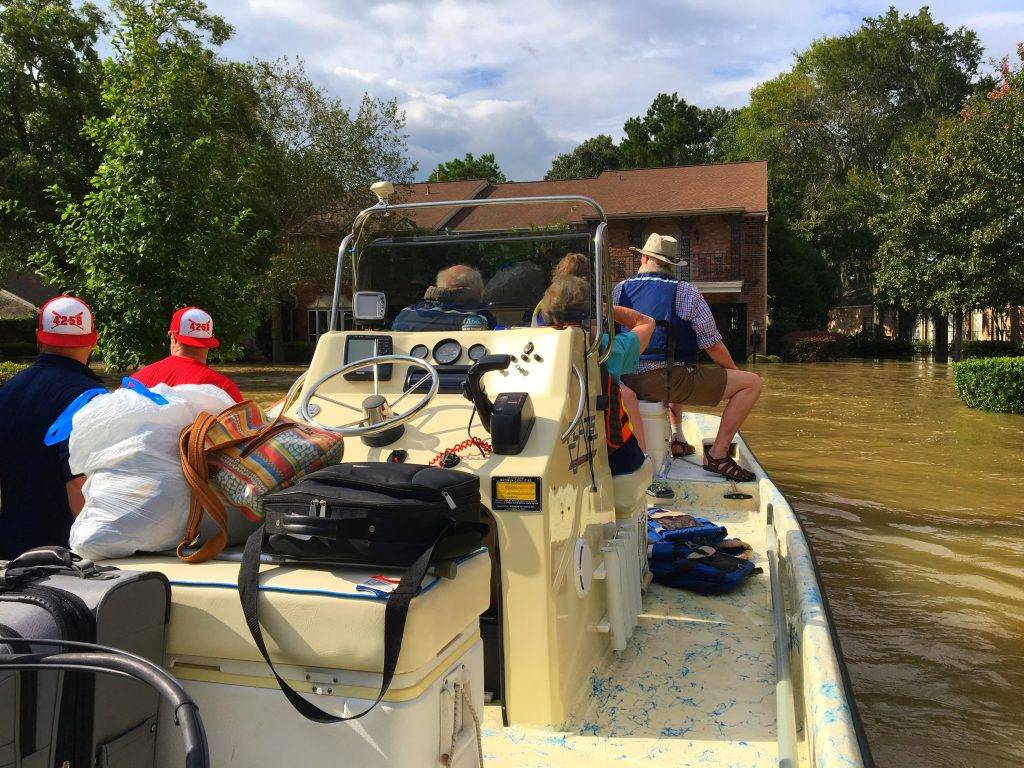
The Iranian: How long were you doing this for?
Hamid Parvizian: We spent four days and, at one point, by the time search and rescue arrived, they had some big boats that were able to get into the really flooded areas. When they opened up the reservoir, there were some areas that we couldn’t get to because of the currents or the depth. The big boats had those spots handled, so we were able to hit up different areas. We spent a lot of time getting animals left behind like cats and dog, and were hitting up more shallow areas or other areas that weren’t touched yet.
But no matter where we were headed, I always ended up going back to one particular location. There were a few major areas, but this one had so many people. [It was on] Gessner, between I-10 which connects east and west on Gessner, down to Briar Forest and Gessner; that area was a complete flood zone. It was right where the bayou ran down the center, and that’s where we kept ending up. Search and Rescue were often calling like, “We need the kayaks over here.”
If I said that there were at least 75 boats in that area, I wouldn’t be exaggerating. The first day that we were out and about, there weren’t very many rescuers. We probably had about 29 people out in Houston helping. That second day, there weren’t as many helpers, but we were able to aid people getting to the big boats, which was more efficient than our transportation. And the next day was the same.
So that area I describe, that’s where I saw stop signs that were underwater next to cars. There were cars so far underwater, that all you could see was currents around them. The kayaks could get pushed over, so we had to be very careful navigating around those cars. I’d never seen anything like this.
The Iranian: What were a few memorable rescues you recall?
Hamid Parvizian: There was one person was on a catheter. A friend of mine who was a doctor came on the boat to help this elderly gentleman down the stairs, and on the boat to safety.
We had one lady where I was on the phone for 45 minutes trying to negotiate for her to come out. She had a disabled son who was a paraplegic. She didn’t want to leave, so I offered her my house, offered her a ride, whatever it would take to get her out and to secure safety for her kid. When she came out she was crying, then I was crying, and she gave me a hug. She said she hadn’t realized how bad it was, and why I was so serious about her getting out, because she always thought this was just another Houston flood that would go away in a day or two. She could not believe the number of boats that were running up and down the main street, and the amount of fire rescue that was there. Nobody expected that, they just thought it was an over-exaggeration. This was a mandatory evacuation, which we’ve never had before.
Everyone came together really well. Some areas would get saturated with helpers, so we’d just move to other areas. In the end, whatever we could do to help was often kayaking people to the big boats which would take them to other areas. We’d load up luggage and people and get them to the boats. It became a real community effort by the fire department, the paramedics, the police.
I remember driving in my Jeep, and they were detouring so many people, but as soon as they saw my Jeep pull up with the kayaks, the police would just open up the barricades and pass me right through and move crowds to the side. It was amazing to see how much the help was appreciated.
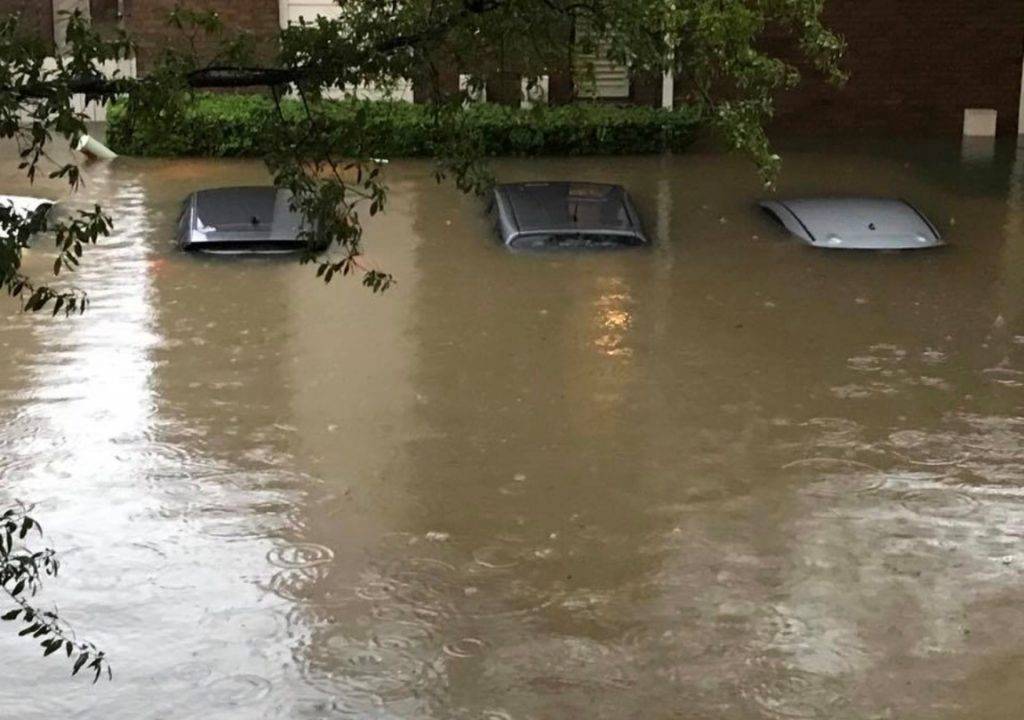
The Iranian: What were some of the significant challenges that you faced?
Hamid Parvizian: There were a few specific ones. One, which I never would’ve thought about: the water moccasins, the snakes in the water, potentially getting flipped because the currents were really high. A few times we were wading in currents that were exhausting [to traverse], so that was a concern. There was also debris moving around that was threatening.
When it really hit home was the final day that I was out. My friend Shirin sent me a text and was like, “You’re done, pull yourself out! The water levels and bacteria levels are so high, that a lot of the rescuers were getting sick with potential e. coli poisoning. So you need to go!” I went, okay, I’m done, that’s it.
But then, I got a call about one family. So I told her, let me get this one family and I’m done, and we went and got them out. Then I got a call about a cat that was stuck in a house, and I knew that the area was really bad, and wasn’t sure if I could do it. We were there until 9pm getting that cat out. I ended up calling up a doctor I knew and asked for a script for antibiotics to be called in immediately, because I was in shorts and a t-shirt, in the water. I wasn’t even in waterproof clothing. So there were a couple of times when I heard about the potential e. coli poisoning. I was gonna just pull out, but you couldn’t. You couldn’t turn around and do that, you had to keep going.
We had one guy who was a potential cardiac arrest. It was a family of four. The emergency units said, if you get there and that’s the situation, call your doctor friend. It was a real triage situation. It wasn’t like, try to get him out of there quickly, because if he was a cardiac arrest, by the time we got him out of there and to a hospital, it might be too late. That put chills down my spine. That’s what kept me pushing through, and waking up early every morning to get out there.
Other challenges were people who didn’t want to leave. They’d say, I’ll think about coming out tomorrow. And seeing all the terrifying looks on the faces of families and kids was really hard.
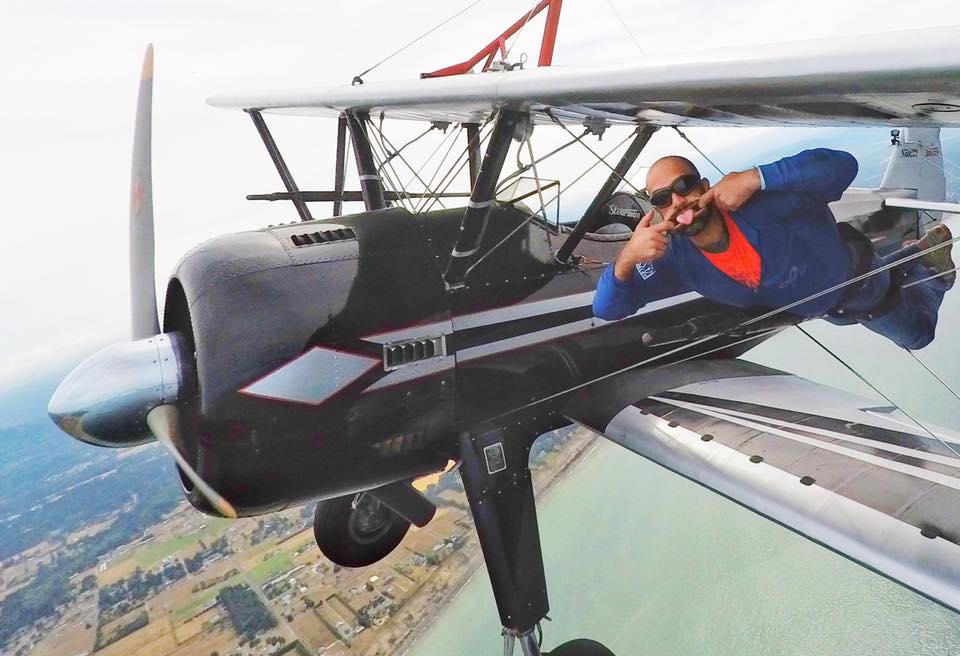
The Iranian: Dancing on the wing of a plane is one thing, but you’re not dealing with invisible bacteria.
Hamid Parvizian: There was another big challenge. So, west of the beltway was completely underwater, and had major currents. We were working in one area where the currents were really bad, and I started hearing reports that one of the two Houston reservoirs was about to breach. We were right in the area of the breach. One of the guys we were talking to was a constable, and we asked him to confirm this. He turned pale white—I said, “man, I was hoping you’d have it together more.” He called to confirm, but we still had a whole group of people we were getting out, so we were just buzzing along. We knew that at 7:30PM they were opening up that reservoir.
At 7:00PM we got the last canoe out and bolted out of there as quick as we could. Once we received0 that scheduled time, we were skating on it. We even heard it breach, which made me really nervous. We pulled our teams as soon as we were able, and all the cops pulled their teams. That was probably the one time that I knew we had to leave and I couldn’t get myself to go, but we worked efficiently and [down to the wire].
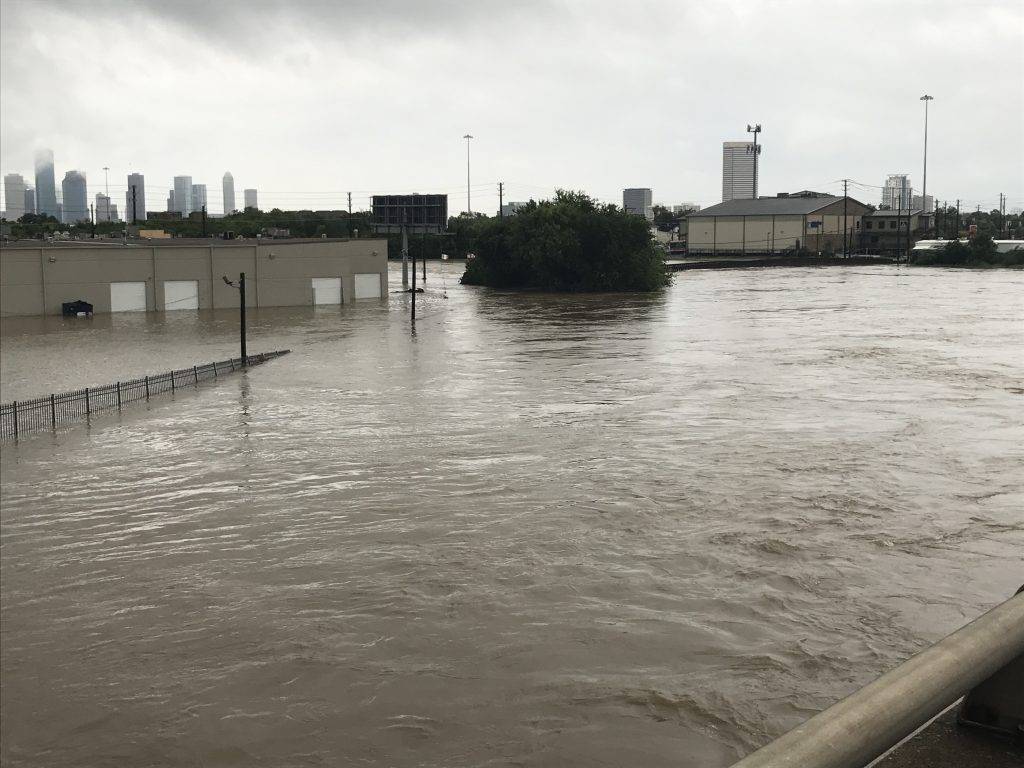
The Iranian: What was the most valuable bit of advice or lesson you learned during this whole experience?
Hamid Parvizian: Take the reports seriously. A lot of people didn’t listen to them. We all have that feeling of being “tough enough to stay.” If they’re telling you to get out, if they’re telling you not to drive your car, don’t think that your car is the one car that’s going to be okay, because when you’re out there you’re putting more lives in jeopardy if you get stuck. When that happens, you’re taking rescue crews away from elsewhere. You’re blocking and making new hazards that everyone will have to get around.
If it comes down to the safety of your family, get out. Take a little vacation. If you’re wrong, you’ve got nothing to lose. Don’t risk your lives. One person said to me, “I’m responsible for my life, if something happens to me than so be it.” My answer to him was, “Sir, we took your two kids out today, they’re terrified for your safety. It’s not your life, it’s theirs.” Nothing of value in your home is worth saving.
Even in Florida, that’s the same message I preached to a lot of my friends. I’m really glad they did get out. It’s not worth the risk of assuming it won’t be that bad. Get out. Prepare as best you can, but think about your family’s safety. A lot of us are all blessed to be able to go out and get a hotel, take a trip somewhere to weather the storm, then come back in. Don’t risk your life or the lives of others, because of pride or ego or machismo.
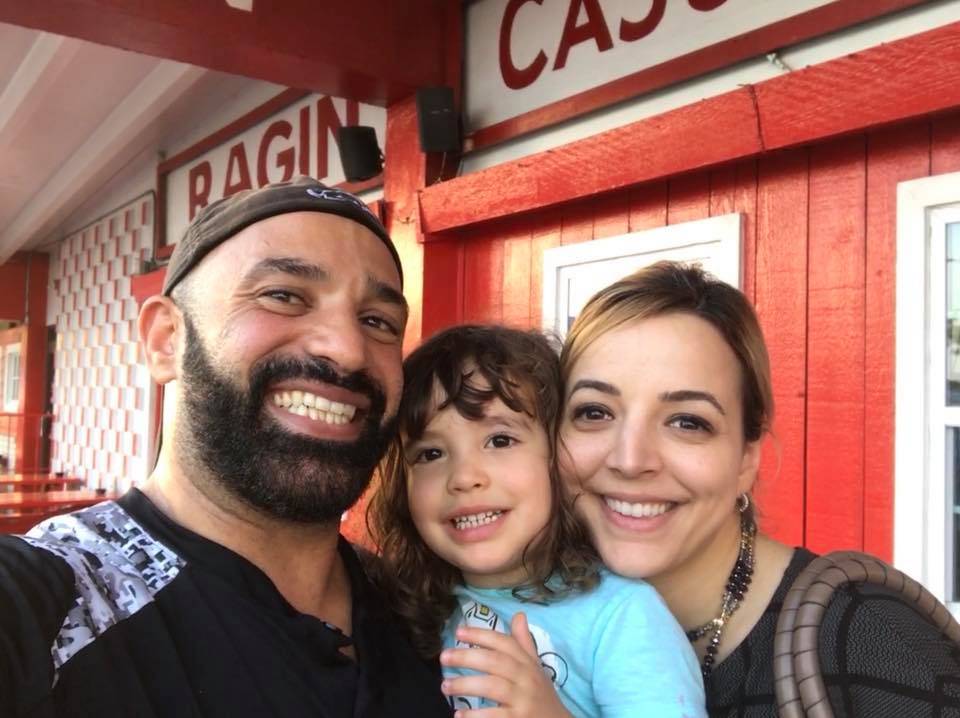
The Iranian: Yeah, take it from the guy who’s had over 500 skydives!
Hamid Parvizian: Right! I’m crazy but not stupid!
My daughter and my family are the most important things in the world to me. While I do put myself in jeopardizing situations, I’m very calculated about every single one of them. I have safety harnesses and climbing rope, preparations for anything that can occur. There are times that my ego powers my thoughts, I love pursuing those experiences, but if my family was actually in Houston? We would’ve been gone. They’re my number one priority.
Skydiving is calculated, but I won’t bungee jump. I don’t trust those ropes. I’ve always wanted to BASE jump, but then I met my wife. It’s not worth the risk, that’s too high-risk for me. But skydiving? I’ll still skydive everyday. It’s actually very calming and relaxing. It’s hard to explain, but when you understand it and see how everything works, it’s actually quite a safe sport, as long as you don’t become complacent.
The Iranian: So, when does the feature film come out?
Hamid Parvizian: [laughs] Someone asked me once how it felt to be that local hero. But I feel like, the cops, the fire department, the ones who had to be on call, who couldn’t leave the cities which got hit directly and had to stay on board. The ones who had to be out there. Those are the heroes.
For me, it was my sense of adventure and love of helping, but the adventure is probably what carried it. Being a Texan, being a Houstonian, I felt like aiding. The cops and the other rescuers, those are the faceless ones that we don’t ever know are there, those are the ones to thank. Me? I had a blast.






